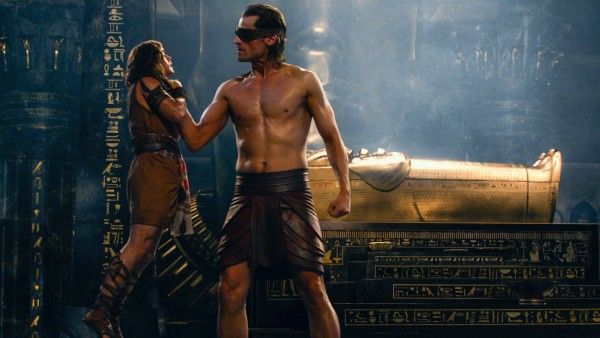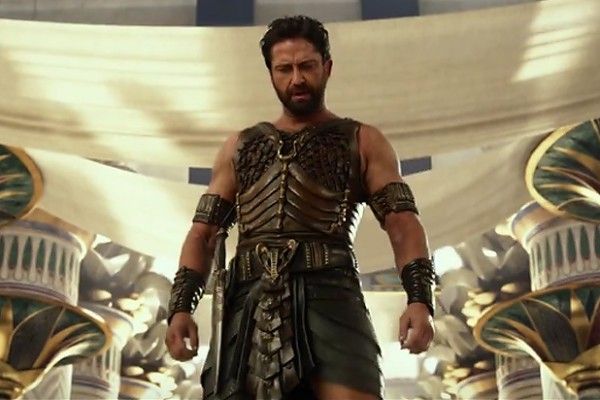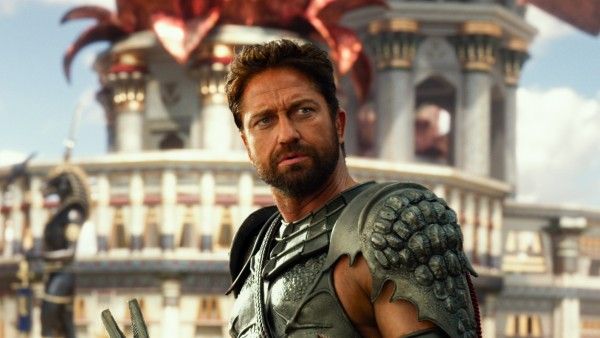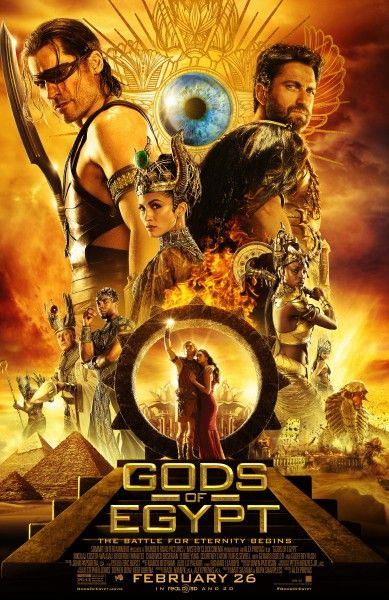Director Alex Proyas had a rough weekend. After spending years of his life on Gods of Egypt, the film received negative criticisms of whitewashing before it even opened and then it flopped at the box office. I sympathize with his emotional state, and I can understand why he took to Facebook to lash out at those he believed responsible for his film’s downfall: film critics (click here for Perri's review).
While it would be easy to write of Proyas’ complaints as sour grapes, and that he would have likely kept quiet if the film was well received by critics or if it had succeeded at the box office, I’ll just respond to what he wrote on Facebook:
NOTHING CONFIRMS RAMPANT STUPIDITY FASTER...
Than reading reviews of my own movies. I usually try to avoid the experience - but this one takes the cake. Often, to my great amusement, a critic will mention my past films in glowing terms, when at the time those same films were savaged, as if to highlight the critic's flawed belief of my descent into mediocrity.
Well that’s because different people have different opinions. That person may really like Dark City and The Crow even if at the time those movies weren’t well received by critics. Keep in mind that the amount of publications has ballooned in that time. In the 90s, print critics were the gatekeepers for reviews, and online voices didn’t get to have much of a say. But you’re allowed to like his older works regardless of the consensus at the time.
You see, my dear fellow FBookers, I have rarely gotten great reviews… on any of my movies, apart from those by reviewers who think for themselves and make up their own opinions. Sadly those type of reviewers are nearly all dead.
With all due respect to Mr. Proyas, I’ve worked as a film critic nearly all my professional life. I’ve spent countless hours around other film critics. I can promise him that they all think for themselves. There’s no agenda at work.
Good reviews often come many years after the movie has opened.
This is kind of a valid point in that more movies should be re-evaluated after they’ve opened, and we do have a bit of a flawed system where sometimes critics only have a couple days to think about a movie before having to review it. Additionally, they’re trying to avoid spoilers, so that also compromises the review.
I guess I have the knack of rubbing reviewers the wrong way - always have. This time of course they have bigger axes to grind - they can rip into my movie while trying to make their mainly pale asses look so politically correct by screaming "white-wash!!!” like the deranged idiots they all are. They fail to understand, or chose to pretend to not understand what this movie is, so as to serve some bizarre consensus of opinion which has nothing to do with the movie at all.
I haven’t seen Gods of Egypt, so I can’t speak to this. To those who saw the movie: does it ever explain why a film that is ostensibly dealing with Egypt has so many white people? Is this a Cloud Atlas situation where there’s a thematic reason for having actors play roles that aren’t their race? I genuinely want to know.
That’s ok, this modern age of texting will probably make them go the way of the dinosaur or the newspaper shortly - don't movie-goers text their friends with what they thought of a movie? Seems most critics spend their time trying to work out what most people will want to hear. How do you do that? Why these days it is so easy... just surf the net to read other reviews or what bloggers are saying - no matter how misguided an opinion of a movie might be before it actually comes out.
Well, texting has been around for a while now, and the age of movie criticism is still thriving, but I think Proyas has touched on the central disconnect of what a film critic does. He thinks we’re in the Consumer Reports business; I think we’re in the artistic evaluation business. Consumer Reports is about how to spend your money and if something is good or bad. That’s where the conversation ends. A thoughtful critic wants to reach out and discuss a film even if he or she knows that the conversation may have to end with agreeing to disagree. The conversation, not the “product”, is the point.
Gods of Egypt was included in a conversation Proyas probably didn’t want to be a part of, which was whitewashing roles, but it’s a conversation that’s important to have, especially for all the non-white actors who would like to get more parts in Hollywood movies. If all you’re concerned with is “Should I see this film or not?” Then that’s a short conversation, and also a meaningless one. As a film lover, I believe people should see as many movies as possible, but given limited resources, perhaps some should be less of a priority than others.
Also, I’m wondering what Proyas sees as a well-guided opinion as opposed to a “misguided” one.
Lock a critic in a room with a movie no one has even seen and they will not know what to make of it. Because contrary to what a critic should probably be they have no personal taste or opinion, because they are basing their views on the status quo. None of them are brave enough to say “well I like it” if it goes against consensus.
This doesn’t make a lot of sense. Someone will have seen a movie before a critic because presumably the director, the editor, the studio, etc. all look at it before release. But more than that, film festivals prove Proyas wrong on this statement. There is no consensus at a film festival, which is part of what makes them so exciting. There's nothing to temper expectations expect the names of the people involved, and it gets even better if you can discover a new talent.
Also, I liked 2014’s Annie, a film with a 27% “Fresh” rating on Rotten Tomatoes. I’m not “brave” for pointing that out or having a positive opinion on that movie, but I’ll tell you right now that every critic who has been doing this for as long as I have (and even less) can point to at least one movie where they went against the grain, not because they were contrarians, but because that’s how they felt. The film moved them in a specific way, they made an argument as to why, and that’s where they stood.
Therefore they are less than worthless. Now that anyone can post their opinion about anything from a movie to a pair of shoes to a hamburger, what value do they have - nothing. Roger Ebert wasn’t bad. He was a true film lover at least, a failed film-maker, which gave him a great deal of insight. His passion for film was contagious and he shared this with his fans. He loved films and his contribution to cinema as a result was positive.
At this point, Proyas seems to have a problem with anyone having an opinion and sharing it with any voice of authority. I don’t know if he recognizes or agrees that some opinions are better informed than others. Just because I eat food on a regular basis, I don’t think that qualifies me to be a food critic, but food critics have a good place in our society. They tell us restaurants worth visiting and dishes worth trying. They expand our world. They’re good advocates, and we can’t be bitter when an advocates points us where we shouldn’t go.
And while I miss Roger Ebert too, there are plenty of critics who have tried to follow in his footsteps (it should be noted that Ebert did a commentary track on the DVD for Dark City and all that supported netted him from Proyas was a “not bad”).
I also disagree with the notion that unless someone tries to make a film they’re not allowed to have opinions on films. You should learn as much as you can, but at some level there’s a barrier. I would never tell someone who couldn’t afford a camera or to go to film school, “Sorry, you’re not allowed to have an opinion on movies because you’ve never worked on a film.” I would tell them that they’ve got to read a lot and watch a lot of making-of documentaries to start learning the nitty-gritty of production, but exclusivity on film criticism doesn't make criticism richer.
Now we have a pack of diseased vultures pecking at the bones of a dying carcass. Trying to peck to the rhythm of the consensus. I applaud any film-goer who values their own opinion enough to not base it on what the pack-mentality say is good or bad.
I value those filmgoers too. Everyone should have their own opinion on a movie. But perhaps Proyas should recognize that sometimes all opinions head in the same direction. On Rotten Tomatoes, the readers gave his movie a 49%, meaning less than half of them thought it was "rotten". Are they all part of the heard mentality as well? Or maybe Gods of Egypt just isn’t a good movie, and lashing out at film critics won’t change that.






